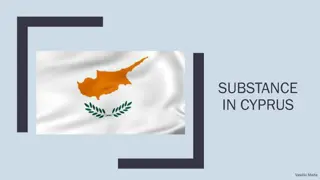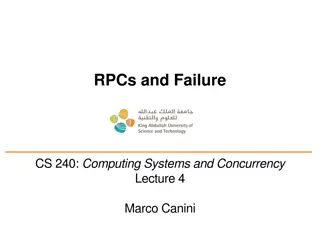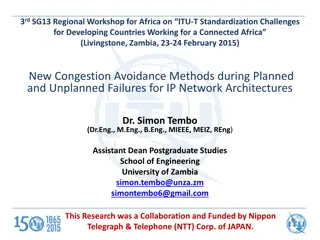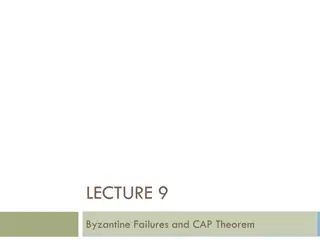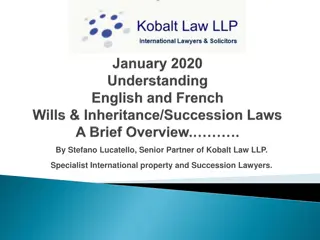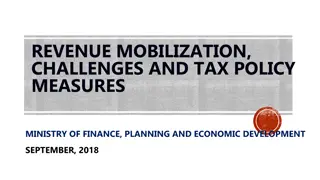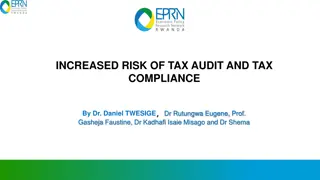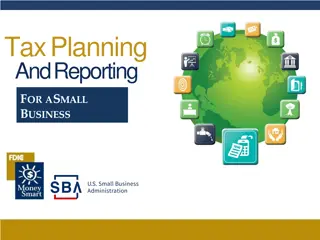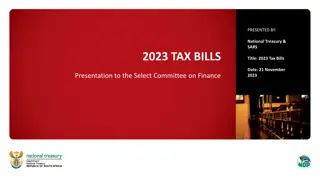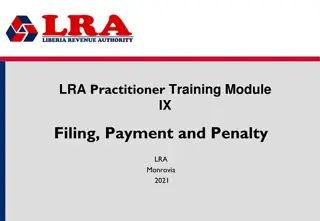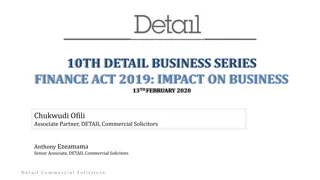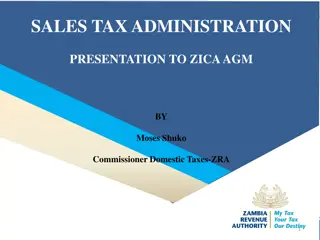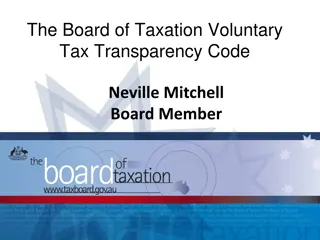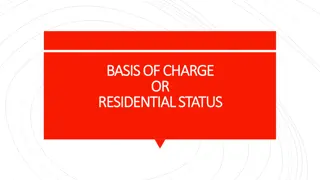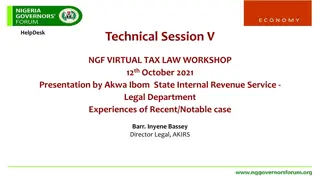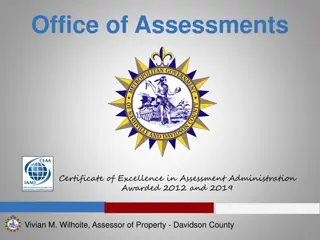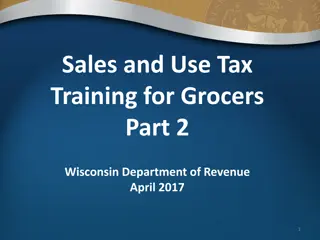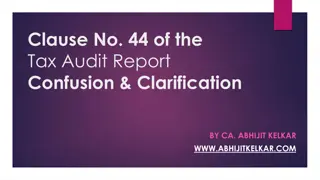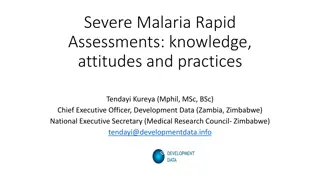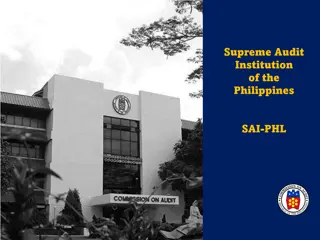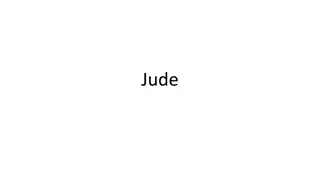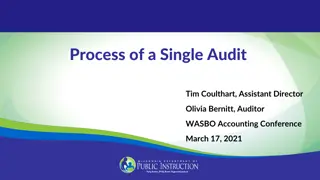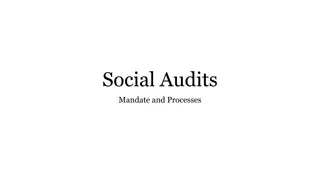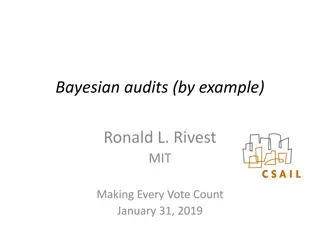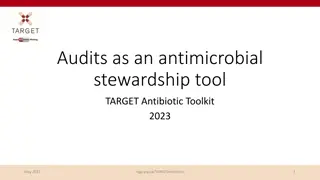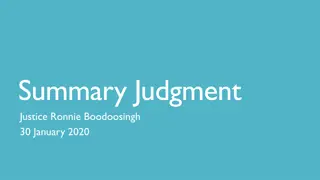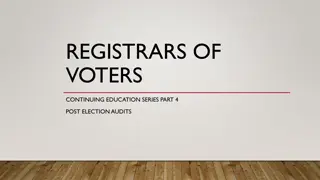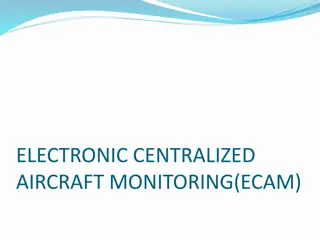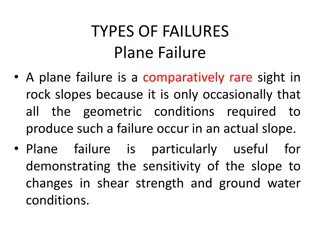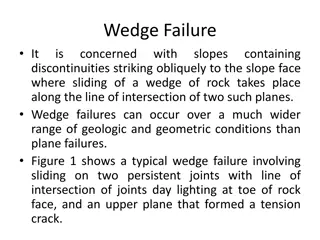Common Failures in Tax Audits and Best Judgment Assessments
Weaknesses in tax audits and best judgment assessments can result in serious consequences for tax entities. Issues such as poor audit practices by consultants and inaccuracies in best judgment approaches can lead to legal disputes and financial losses. Understanding these common points of failure is crucial for avoiding pitfalls in the tax process.
Download Presentation

Please find below an Image/Link to download the presentation.
The content on the website is provided AS IS for your information and personal use only. It may not be sold, licensed, or shared on other websites without obtaining consent from the author. Download presentation by click this link. If you encounter any issues during the download, it is possible that the publisher has removed the file from their server.
E N D
Presentation Transcript
HelpDesk TECHNICAL SESSION II: The Tax Process & The Law - Common Points of Failure NGF VIRTUAL TAX LAW WORKSHOP 11th October 2021 HON. CHUKWUEMEKA EZE, FCTI Legal Adviser, CITN & WAUTI and Chairman, Tax Appeal Tribunal, South-East Zone.
CONTENTS Weaknesses in Preparing Cases for TAT or the High Court o Poor Audit Conducted by Consultants. o Poor Best of Judgement Approaches. o Not Understanding the Limit of BoJ. o Failure to use TAT or Courts to Collect Information. o Tax audit/Tax Investigation/Tax Intelligence/Inspection of documents Recommendation and Conclusion
POOR AUDIT CONDUCTED BY CONSULTANTS: HelpDesk Some SIRS engage tax consultants for audits who end up not doing the audits properly or doing it at all. The most common failure is where a consultant, in the guise of Best of Judgement (BoJ), cooks up figures purportedly representing the emoluments of workers in a PAYE system notwithstanding that the actual documents such as financial statements, ledgers, trial balance, cash books and invoices exist. Some Directors of Audit of many SIRS accept the resultant figures as the actual liability of the PAYE entity or taxpayer, without question. During cross-examination in the course of trial, such consultants find it difficult to defend these cooked up figures thereby leading to the collapse of the defence of the Revenue Service. The decision in Union Bank v. Anambra State Internal Revenue Service, TAT/SEZ/005/19 delivered on 10th March, 2021 against the Revenue Service showed that the tax consultant did no work but just adopted the work of a previous tax consultant and purportedly marked it up by 5% and imposed the total sum as BoJ. Besides, the figures did not even add up and were not proved, yet the Revenue Service expected to succeed.
Poor Best of Judgement Approaches I HelpDesk Even though a BoJ is an estimated sum, the estimation must be scientific, meaning that the factors supporting the case for BoJ must be verifiable from some existing facts. In the case of Mark Chigbo v. Commissioner of Board of Internal Revenue (High Court of Eastern Nigeria, Enugu: Reynolds, J.)(unreported) delivered on 11 November, 1957, it was decided that due to evasions and prevarications of the appellant, the Committee was left with no option than to assess the appellant (a transporter with a fleet of 3 vehicles) through best of judgment. In this case, the tax authority provided the basis of their assessment which the court could uphold based on the evidence adduced. BOJ cannot exist in vacuo. The BoJ has to be reasonable and not punitive. In the case of Saydoun Limited v. Edo State Board of Internal Revenue (2019) 41 TLRN1, the Edo State High Court stated (in a case involving the exercise of Best of Judgment assessment of the expatriates of the claimant) that the law places a duty on the relevant tax authority to act honestly and reasonably in making best of judgment assessment and that the law will not allow the relevant tax authority to inflict any assessment on a taxpayer which tends to be punitive in nature.
Poor Best of Judgement Approaches II HelpDesk Issuance of a BoJ must accord with the applicable tax laws. In Star Deep Water Petroleum Limited v. Federal Inland Revenue Service (2016) 23 TLRN 14 @ pp. 21-22, the court reinforced the need for Best of Judgment assessments to be in accordance with the provisions of applicable tax laws. This will be addressed later in this presentation. A BoJ must not be vindictive or used for settlement of political scores. In Barr. Michael Odo v. Ebonyi State Internal Revenue Board,* TAT/SEZ/003/2019, the judgement , delivered by TAT SEZ on 8th September, 2021, found that the Revenue Board, which has been accepting about N25,000 from the taxpayer as Personal Income Tax and had given him Tax Clearance Certificates (TCC) in accordance with section 85 PITA, suddenly made a BoJ in the sum of N50 million as a result of alleged political pressure from the Government who wanted the taxpayer punished as a result of his legal representation of opponents of the government. In the conduct of the trial the revenue service was unable to substantiate the basis of their BoJ. As a result the TAT set aside the BoJ, which had no basis for its issuance and was punitive.
HelpDesk The Limits of BoJ BoJ is a statutory requirement. Where it is not provided for in a tax law, the tax administrator cannot invoke it. In First Bank v. Anambra state IRS, TAT/SEZ/006/20, the TAT on 13th September, 2021, pointed out that the Stamp Duties Act has no provision for BoJ hence the Assessment Notice of the Respondent demanding for the sum of about N102 billion from the Appellant for stamp duties on bank electronic receipts was improper, for many reasons, but notably for invocation of a BoJ which is not provided for in the Stamp Duties Act. BoJ does not generally apply to PAYE but many tax authorities seem to be ignorant of this. Recall that the employer is an agent of the tax authority. See Section 82 PITA. Refer also to Group 4 Securicor Nigeria Limited v. LSIRS, Appeal No. TAT/LZ/006/2013. This being so, a tax authority should not be in a hurry to impute BOJ in a PAYE situation. The authority on this is Nigeria Breweries PLC v. Lagos State Internal Revenue Board (2002) 5 NWLR (Pt. 759).
HelpDesk Actions the Tax administrator can take to Improve their BoJs for the Acceptance of TAT and the Courts The law has not left the tax administrator prostrate and unable to obtain evidence for a reasonable BoJ just because a taxpayer or a tax agent has refused to deliver documents required of him. The following options are available: i. File an application at the Tax Appeal Tribunal (TAT) or a High Court requesting for the person concerned to release certain documents in his custody to tax authorities. The authority on this is the case of GTB v. Ekiti State Board of Internal Revenue (2018) LPELR-46307; ii. Invite the actual taxpayers and obtain independent information from them including documents, especially in a PAYE situation. Reference is made to Sections 47 & 82 PITA ; iii. Invite bankers and obtain relevant information from them. Read Section 49 PITA; iv. Review the documents in your possession and establish its insufficiency before requesting for additional documents.
HelpDesk Tax Audit vs Tax Investigation & Additional Assessments I When is an investigation not an investigation ? For a case to amount to investigation, the tax authority alleging fraud must provide the taxpayer or agent with the particulars of fraud and give him the opportunity of fair hearing. The reference is made in *Section 36(1) of the Constitution*. Please also note that: An investigation connotes that a crime has allegedly been committed. Allegations of crime even in civil cases must be proved beyond reasonable doubt. See *Section 135 of the Evidence Act, 2011. Why is the distinction important? In a bid to circumvent the six-year bar prescribed by Sections 54(5) for PAYE entities, and for taxable person with respect to additional assessment under Section 55(1) PITA, some SIRS claim to have carried out a tax investigation on taxpayers and PAYE employers (Section 55(2) PITA), or made additional assessments under Section 55(1) PITA . But when reviewed they actually carried out a tax audit under section 47(4) PITA on a taxable person or assessment of a PAYE entity under Section 54(5) PITA.
HelpDesk Tax Audit v Tax Investigation & Additional Assessments II Under Section 54(5) PITA, there are 2 possible and disjunctive conditions that will exist before a tax authority can assess the employees of a tax agent under a PAYE system for up to six years, but certainly not beyond six years: (a) an employee applies to the relevant tax authority to be assessed, whether in connection with any claim to repayment of tax or otherwise; or (b) the relevant tax authority considers the assessment to be necessary so as to arrive at the correct amount of the income tax to be charged on or to be payable by the employee for that year. There is no provision in PITA that permits a tax authority to assess a PAYE entity beyond 6 years or to carry out tax investigation against it.
HelpDesk Tax Audit v Tax Investigation & Additional Assessments II The window to proceed beyond the six-year limit contained in Section 55(2) PITA relates to "a taxable person." An entity under a PAYE system is not a taxable person. It is, therefore, without lawful basis that tax authorities demand that PAYE entities should provide records for tax investigation for 7 or above years. In other words, a PAYE entity is not susceptible to tax investigation under section 55(2) PITA but to tax assessment under section 54(2) PITA. Note further that the provision for tax audit contained in Section 47(4) PITA relates to the income or gains of 'a person' and not a PAYE entity. Be aware that the Tribunal will check whether it is a proper case of audit or investigation in considering how many years of additional tax to consider with respect to a taxable person. Merely captioning a letter or demand to be of the character of tax investigation does not automatically make it a case of tax investigation. The provisions of tax statutes are interpreted strictly. See Cape Brandy Syndicate v. I.R.C. (1921) 2 K. B. 403.
Recommendations HelpDesk Provide adequate training of SIRS legal representatives on tax laws. It is important that if the SIRS relies on lawyers seconded to the IRS from Ministry of Justice such lawyers either have some experience in tax law or a keen interest. Regular training should be provided to the legal team on both general taxation matters (so they understand fully the context they are working in), in more specialised tax law training. Build on your SIRS Research Departments. A rich research department is important, For example knowledge on the authority of a SIRS to collect stamp duties on bank electronic receipts was a product of intense research by counsel of both parties on the prompting of the Tribunal. Exchange of information and knowledge with other states. Approaching a relevant officer of the Revenue Service of another State for relevant information should be encouraged. Consider a legal community of practice under the Joint Tax Board.
HelpDesk THANKYOU


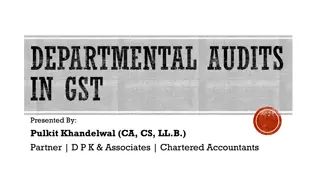
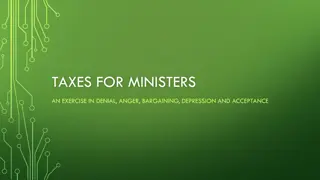
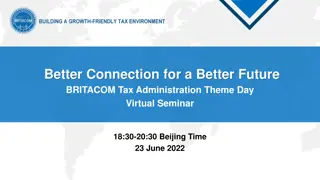
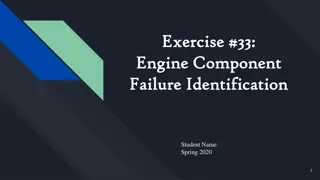
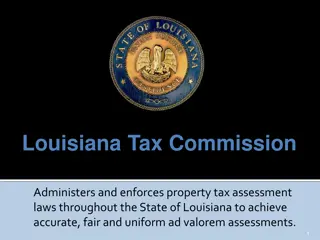
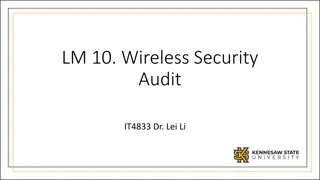
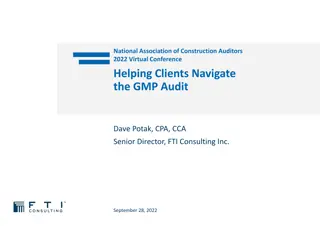

![Town of [Town Name] Real Estate Tax Rates and FY 2024 Budget Summary](/thumb/62211/town-of-town-name-real-estate-tax-rates-and-fy-2024-budget-summary.jpg)
